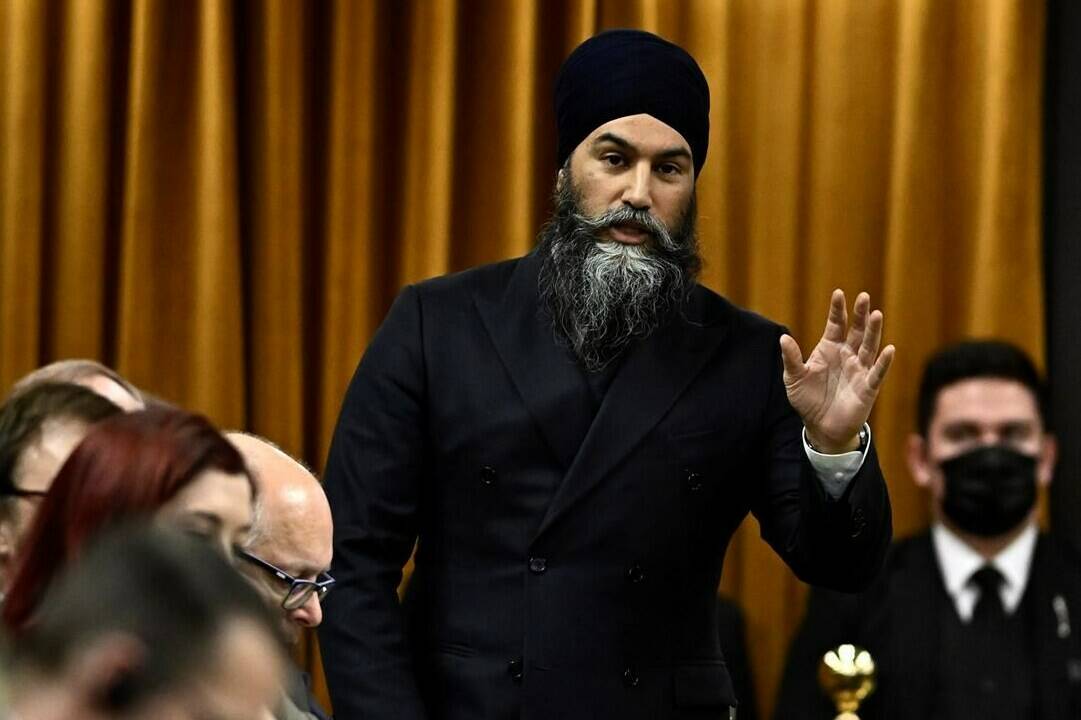The societal fissures forming around the war between Israel and Hamas in the Gaza Strip played out Monday in the House of Commons as an NDP motion to recognize Palestine as a state was turned on its head before the final vote.
MPs debated the non-binding but highly symbolic motion for hours, reflecting the emotional dispute about the Palestinian right to self determination and Israel’s right to defend itself that has unfolded over the months since the Oct. 7 Hamas attack.
But at the 11th hour, the governing Liberals tabled a substantial motion that dramatically softened the NDP’s original call, to the dismay of Opposition Conservatives and at least two Liberal MPs who planned to vote against the original motion.
The amended version instead urges Canada to “actively pursue” the establishment of a Palestinian state as part of a negotiated two-state solution, which aligns with Canada’s existing policy.
It also included reference to Hamas as a terrorist organization, and a demand that Hamas lay down its arms.
Arguments that MPs hadn’t had time to think about or debate the rewritten proposal were overruled, and the new motion passed by a margin of 204-117.
The ongoing war has opened rifts in the Liberal caucus, with some members staunchly defending Israel as others call the country out for the mounting death toll in the Gaza Strip and violence in the West Bank.
Earlier in the day, Montreal Liberal MP Anthony Housefather gave an impassioned plea in the House, describing how “demoralized and intimidated” the Jewish community feels.
“This motion creates one winner and one loser,” he said of the version initially tabled by the NDP.
“The way this motion is constructed, it is clearly creating a false equivalency of the state of Israel and the terrorist organization Hamas.”
Housefather, a vocal critic of his own party’s handling of the conflict, voted against the amended motion, as did former cabinet minister Marco Mendicino and Manitoba MP Ben Carr.
When NDP foreign affairs critic Heather McPherson initially tabled the motion Monday, she said that “now is the time to recognize Palestine.”
She detailed the unfolding humanitarian crisis amid the Israel-Hamas war, adding that the thousands of Palestinian children who are facing starvation “are not Hamas.”
“The choice to refuse aid to these children is political,” McPherson said.
Despite the massive changes to her motion, the NDP celebrated the passing of the amended version as a historic win.
The NDP “forced the Liberals,” to stop selling arms to the Israeli government, support the International Court of Justice, and place sanctions on extremist settlers in the West Bank, the party’s leader Jagmeet Singh said on the social media platform X, formerly known as Twitter, on Monday night.
However none of the measures in the motion are binding, and many now reflect the Liberal’s existing policy.
B’nai Brith Canada expressed outrage after the House passed the motion, calling it an “unprecedented and appalling anti-Israel proposal.”
“Canada must not stand in the way as Israel works to neutralize the terrorists who are preventing the implementation of a sustainable peace,” the group’s director of government relations, David Granovsky, said in a statement.
Michael Chong, the Conservative foreign affairs critic, said his party believes in a two-state solution, but that it must come as a result of negotiations between Israeli and Palestinian representatives.
Such a process could take months, “if not years,” the MP said.
Foreign Afairs Minister Mélanie Joly, too, told the House in French that lasting security for both Israelis and Palestinians would only be achieved through a “negotiated political solution.”
Nevertheless, Melissa Lantsman, one of the Conservatives’ deputy leaders, said Joly’s statements left Canadians with a muddied impression of the government’s position. Lantsman accused it of having none.
“They send one group of MPs into one community to say one thing, and another group of MPs into another community to say another thing … they have no moral clarity,” Lantsman said.
Lantsman called recognition of Palestinian statehood a “blind sellout to the forces of evil at home and abroad” and “a dead giveaway to a group literally defined as terrorist by Canadian law.”
Canada’s policy to support the creation of a “sovereign, independent, viable, democratic and territorially contiguous” state for Palestinians has remained unchanged since the war began.
The government has not spoken to whether Canada should officially recognize Palestine as a country outside of a negotiated settlement, but some allies are considering it.
Prime Minister Justin Trudeau spoke Monday with Benny Gantz, Israel’s defence minister, who said on social media that he was grateful for Trudeau’s commitment to Israeli security.
But Gantz also warned that unilateral recognition of Palestine would be “counter-productive to the mutual goal of long-term regional security and stability, and would ultimately reward terrorism.”
A readout of the call published by the Prime Minister’s Office made no mention of the motion but said Trudeau “underscored the importance of renewing efforts toward a two-state solution to secure lasting peace in the region.”
In late January, the United Kingdom said it was looking into unilateral recognition of Palestine, with Foreign Secretary David Cameron saying it would preserve momentum toward a two-state solution and a peaceful goal for Palestinians to work toward.
U.S. President Joe Biden’s administration made similar comments in February, amid concern that the Israeli government was moving to block the viability of an eventual Palestinian state.
The war began when Hamas militants stormed into southern Israel on Oct. 7 and killed 1,200 people, taking another 240 hostage.
Authorities in the Hamas-controlled Gaza Strip say Israel’s military offensive in the densely populated area has killed at least 31,700 Palestinians, including thousands of children.
READ ALSO: Canada says it will join effort to get aid to Gaza through sea corridor

